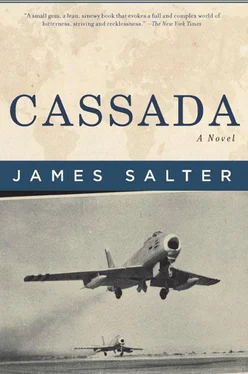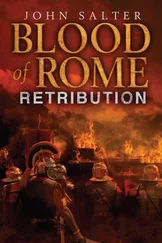Snow showers had been reported moving in from Luxembourg. The field was expected to go down to five hundred and one—five-hundred-foot ceiling and one-mile visibility—within twenty minutes.
Cassada was flying with Dumfries. They were at altitude about thirty miles out, the ground only occasionally visible through the solid, white clouds. They were in spread formation and Dumfries, who was leading, did not turn homeward but seemed to ignore the call.
“Green Lead, did you hear that?” Cassada said.
“Uh, negative. I couldn’t read it. My radio is cutting in and out.”
“They’ve ordered us to return to base. The weather’s closing in.”
“Roger,” Dumfries said.
“They say it’s going to five hundred and one within twenty minutes. Snow showers.”
“Close it up, Two,” Dumfries instructed.
Dumfries was completely without imagination, mechanical in his processes. Twenty minutes was to him an exact figure, a time when the ceiling would come down like the curtain in a theater. His nickname was Dum-dum, which he complained made no sense. “That’s a kind of bullet,” he said.
When Cassada joined up on his wing, Dumfries said, “Go Channel Eight, Green.”
His own head went down as he looked to check that he had gone to the right channel, and almost at the same time he heard Cassada say, “Green Two.”
“Roger.”
They were at twenty-five thousand feet and began to let down. As they descended they could hear ships from the other squadrons entering traffic, calling on the break. From time to time the tower would block them out: “Attention, all 5th Group aircraft. Snow showers are reported north and west of the field, closing in. You are advised to return and land as soon as possible.”
Cassada, hearing it—the calls, the other formations inbound—still new to it, felt a kind of electric happiness, a surge of excitement. Their speed was building. The air was heavier and more dense as they came down, nearing the cloud tops, then skimming them. He was confident they would get back to the field and at the same time felt a nervousness; it was in his arms and legs. The radio was alive with voices. From all directions planes were coming home.
As if following an actual path, Dumfries banked this way and that between the clouds and soon they were in the shadowy zone beneath, the brightness gone.
“Green has two at ten o’clock,” Cassada called.
“I’ve got ’em.”
Ahead the field appeared and like this, part of the instreaming pairs and flights of four, they entered traffic aware they were being observed like all the others, broke hard—some damp days it was possible to pull streamers, long, snake streaks of vapor pouring from the wingtips—came around and landed.
Though they had done nothing more remarkable than return without delay to the field, the repeated ominous warnings from the tower, the solid advancing wall of snow already visible, the many planes, some of them close behind, others breaking at the last minute overhead—all of it made for a feeling of achievement. It was as if they were returning from an actual mission, Cassada thought, a combat mission. He had missed all that, the thing that gave the major, the flight commanders, Isbell, even some of the pilots a greater authenticity. To return and land smoothly, in triumph.
Canopies open they taxied back towards the squadron at the other end of the field. There was a wood and wire fence to the side most of the way and beyond it the wide fields broken into clods and dark with manure. The smell in the air was the cold though. The first flakes of snow were already falling. The wind was from behind and warm waves of exhaust were blown forward together with the thin whistle of engines idling. Halfway along the fence, two drably dressed boys were standing motionless, hands in their pockets, their white faces plain to see, even the blotched red of their cheeks. Great as limousines the planes passed by them, bumping slightly on the expansion joints in the concrete. Tentatively, as if it might be ignored, one of the farmboys waved and Cassada, a god, arm resting on the cockpit railing, raised it and waved back. He was at last all he had dreamed of. The wave, he knew, had been recognition. Both boys were waving now, their arms jerking wildly. Dumfries had not seen them.
Cassada’s parking spot was at the far end of the line. Dumfries waited at the edge of the ramp as he came trotting, his helmet still on to keep his ears warm. The snow was coming down harder. To the west it was white, earth and sky had vanished. It was a dry snow, small and hard, blowing along the ground like ashes, consuming the trees. The only place it was sticking was in the grass.
Joking, feeling good, they hung up their equipment and went into the briefing room, working the cold out of their faces.
“Wow,” Cassada said, grinning.
“Good thing you heard that call, ordering us back.”
“You wouldn’t think it could go bad that quick. The weather.”
Wickenden had walked in behind them carrying some letters he’d just received in his hand. He stood there, flicking the envelopes with his thumb.
“We just barely beat it in here, Captain,” Cassada told him excitedly. “You could see the snow, big wall of it, right out to the west.”
“I don’t know about beating it in,” Wickenden said, “but when you pulled out of here you blew stuff all over the place. You must have been using ninety percent.”
“No, sir,” Cassada said.
“Don’t say, ‘No, sir.’ I was watching it. I saw a pair of chocks go flying twenty feet.”
“No, sir,” Cassada told him. “I don’t know how much I used, but it wasn’t over fifty or sixty. It wasn’t even that.”
“The hell it wasn’t.”
“It was fifty or sixty percent at most.”
“Would you like to make that an official statement?”
“Official statement?”
“Yes. You know what that is? You can get court-martialed for making a false official statement.”
“I’ll make any kind of statement you want.”
“Just watch what you’re doing,” Wickenden warned. He left the room.
Cassada looked down at his shoes. He kicked a little at something that wasn’t there. Then, silent, his face expressionless, he began to take his flying gloves off, intent, pulling at the tip of each finger with his teeth to loosen the clinging leather.
“Well…” Dumfries began.
Cassada glanced at him.
“You’ll get used to it,” Dumfries said. “That’s just the way he is.”
Cassada said nothing. Finally he let out a sigh.
They stood near one of the radiators and talked about the flight, the earlier part of it. The snow was coming down more and more densely, curling as it neared the ground, sweeping along. Cassada was looking at it moodily, nodding every so often at something Dumfries said.
“Don’t let it bother you,” Dumfries advised toward the end.
“It isn’t that,” Cassada said after a moment. He slapped his gloves against his leg, staring blankly at the spot. “It’s not just that. If he doesn’t want to believe me, then don’t ask me. It’s the same as being called a liar. I’m not a liar.”
“That’s just the way he talks. It’s different than in the other flights.”
Dunning sat down in Isbell’s office with a broad smile, laced his fingers across his stomach, and stretched out his legs. He had been looking at the flying time chart. “We got them this month, all right, Tommy,” he said.
“Yes, sir. I think we do.”
“Wait till Pine finds out.”
It was the end of the month. They had outflown everyone, the yellowtails especially. “It would be nice to beat them for the year,” Dunning added.
Читать дальше












